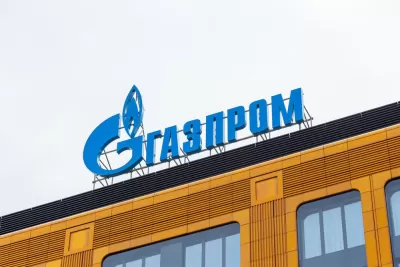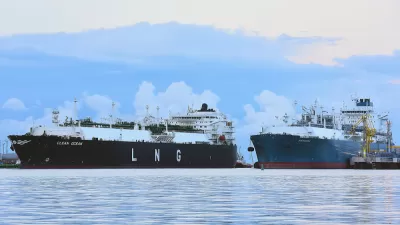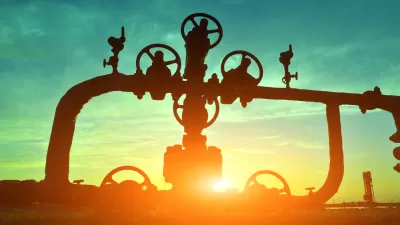When President Putin ordered Gazprom to turn off the valve on pipelines carrying Russian gas to Poland and Bulgaria, he effectively expanded the Russia-Ukraine war to the European Union, threatening their economic well-being and way of life.

Ursula von der Leyen, the president of the European Commission, hit back hard at Russian President Vladimir Putin's cutoff of natural gas to two of the E.U.'s 27 member nations on April 27.
“Gazprom's announcement that it is unilaterally stopping gas deliveries to certain E.U. member states is another provocation from the Kremlin” she stated in Brussels on Wednesday (1:24 minute AP video via The New York Times).
“It comes as no surprise that the Kremlin uses fossil fuels to try to blackmail** us… Our response will be immediate, united and coordinated.
“Both Poland and Bulgaria are now receiving gas from their EU neighbours,” she said. “The era of Russian fossil fuels in Europe will come to an end.”
Russian President Vladimir Putin has attempted to turn up the pressure by insisting that Russia will only accept payments for gas in roubles – hoping to force his foes to prop up his currency," writes EURACTIV's Frédéric Simon on April 27.
But von der Leyen said that “about 97%” of all EU contracts explicitly stipulate payments in euros or dollars and warned importing firms off paying in roubles.
“This would be a breach of the sanctions,” she told reporters.
EU provides 'workaround'
While von der Leyon made a forceful presentation on standing up to Putin, her members don't want to have their gas delivery halted like Poland and Bulgaria, so the commission has essentially devised a 'workaround' for the sanctions, described by Matina Stevis-Gridneff, Brussels bureau chief for The New York Times, on April 27 in the source article for this post.
The guidance suggested countries could set up new bank accounts with Gazprombank, a privately held arm of Gazprom which has been deliberately left off E.U. sanction lists. The countries could then pay into those accounts in euros, on the understanding that the bank would then convert them to rubles and pay Gazprom’s export company in that currency. On paper, that mechanism would keep the E.U. countries or companies at arm’s length from the conversion.
Germany plans for rationing
The Associated Press reported on April 28 that most countries will be using this scheme.
“Europe (and) Germany will make payments in euros and others may pay in dollars, and not in rubles,” Germany’s Economy Minister Robert Habeck said Wednesday (April 27).
"The conversion, once the payments have been made, is a matter for Gazprom. We have discussed this with the European Union. We will continue down this path.”
A cutoff of Russian gas would likely have the most profound impact on Germany, Europe's large economy. Stevis-Gridneff observed in an earlier post that it “is the key country holding the bloc back from an outright ban on oil and gas, though the idea is also unpopular in other, smaller European nations that largely rely on Russian supplies.”
Planning has begun to prepare for the cutoff possibility, including gas rationing.
At the outset of the war, Germany relied on Russia to meet 55 percent of its natural gas needs," writes Berlin-based Melissa Eddy for The New York Times on April 28.
Since Moscow’s invasion of Ukraine on Feb. 24, the country has reduced that amount to 35 percent by canceling some contracts and importing more liquefied natural gas, or L.N.G., from other countries.
Earlier this year, the government began a review process that could, if necessary, mandate gas rationing. But if Russia were to stop gas flows to Germany, the economy ministry reported to Parliament recently, the situation could become critical quickly.
Russian oil embargo coming
Earlier in April, Germany agreed to an EU ban on Russian coal which would take four months to fully enact. Oil would be next, adds Eddy.
[Germany] will soon be in position to do the same with oil, Mr. Habeck [the economy minister] said this week, after a trip to Poland that he said was part of the government strategy “to step by step, set the conditions and to meet them” to achieve independence from Russia.
“And now we will do the same thing with gas,” Mr. Habeck said.
The next day, Germany agreed "to a gradual, EU-wide embargo” of Russian oil, reports Quartz correspondent, Samanth Subramanian, on April 29.
**Footnote on 'blackmail': Steve Inskeep, host on NPR's Morning Edition, asked energy expert, Daniel Yergin on April 28, "We heard the Russia move called a warning shot. Europeans have also called it blackmail. How would you describe it?”
Well, I think it is a major sign that Putin just a couple of weeks ago said that Europe can't do without energy," Yergin, author of The Prize, The Quest, and most recently, The New Map: Energy, Climate, and the Clash of Nations, responded. “I think he's demonstrating with this that he will use energy as a weapon or try to use it.”
For the transcript and 7-minute audio, see “Experts expect Putin will try to weaponize its energy resource.”
FULL STORY: E.U. countries scramble to find a way to pay Russia for gas without violating sanctions.

Maui's Vacation Rental Debate Turns Ugly
Verbal attacks, misinformation campaigns and fistfights plague a high-stakes debate to convert thousands of vacation rentals into long-term housing.

Planetizen Federal Action Tracker
A weekly monitor of how Trump’s orders and actions are impacting planners and planning in America.

In Urban Planning, AI Prompting Could be the New Design Thinking
Creativity has long been key to great urban design. What if we see AI as our new creative partner?

California Creates Housing-Focused Agency
Previously, the state’s housing and homelessness programs fell under a grabbag department that also regulates the alcohol industry, car mechanics, and horse racing.

Chicago’s Ghost Rails
Just beneath the surface of the modern city lie the remnants of its expansive early 20th-century streetcar system.

Baker Creek Pavilion: Blending Nature and Architecture in Knoxville
Knoxville’s urban wilderness planning initiative unveils the "Baker Creek Pavilion" to increase the city's access to green spaces.
Urban Design for Planners 1: Software Tools
This six-course series explores essential urban design concepts using open source software and equips planners with the tools they need to participate fully in the urban design process.
Planning for Universal Design
Learn the tools for implementing Universal Design in planning regulations.
planning NEXT
Appalachian Highlands Housing Partners
Mpact (founded as Rail~Volution)
City of Camden Redevelopment Agency
City of Astoria
City of Portland
City of Laramie





























